Bitcoin price volatility persisted throughout the day, with the anticipated weekend surge failing to materialize. Adverse U.S. economic data further impacted cryptocurrencies, driving Bitcoin below $70,880. Increases in hourly wages and disappointing Non-Farm Employment data contributed to the downturn. So, what is the latest development in the spot Bitcoin ETF sector?
BlackRock’s Bold Move
In mid-2023, BlackRock, the world’s largest asset manager, made a surprising entry into the Bitcoin sector. Amidst legal battles involving Binance and Coinbase, BlackRock submitted a bold application for a spot Bitcoin ETF with the SEC. This move galvanized other companies to follow suit, although none could match BlackRock’s substantial reserves. With only one ETF rejection out of 576 applications, BlackRock’s confidence was evident.
The IBIT spot Bitcoin investment fund, launched by BlackRock on January 11, quickly gained traction. While the GBTC fund experienced continuous net outflows, IBIT saw significant growth, with daily net inflows reaching hundreds of millions of dollars. In just five months, IBIT’s reserves exceeded 300,000 BTC, roughly valued at $21 billion.
Spot Bitcoin ETFs
For years, U.S. investors relied on the GBTC product for Bitcoin investments, despite its high risk due to fluctuating premiums. Those who capitalized on negative premiums bought at significant discounts, reaping substantial gains when ETF approvals normalized the premiums. Last week, IBIT surpassed Grayscale’s GBTC in total size, becoming the largest ETF in terms of reserves, a market GBTC had dominated since its 2015 launch.
With a competitive 0.25% fee, IBIT attracted massive net inflows, while GBTC, which charges a 1.5% fee, saw its reserves shrink from $28.7 billion to $20 billion. This shift underscores the growing preference for more cost-effective investment options.
Key Takeaways for Investors
- BlackRock’s aggressive entry into the Bitcoin ETF market has reshaped the competitive landscape.
- IBIT’s lower fees and rapid growth highlight the market’s preference for cost-effective options.
- Investors taking advantage of negative premiums in traditional funds like GBTC can see substantial returns once premiums normalize.
- The shift in market leadership from GBTC to IBIT signals a broader acceptance and institutional interest in Bitcoin ETFs.
As BlackRock’s Bitcoin ETF continues to dominate the market, it remains to be seen how competitors will respond to this significant shift in the landscape of cryptocurrency investment funds.













